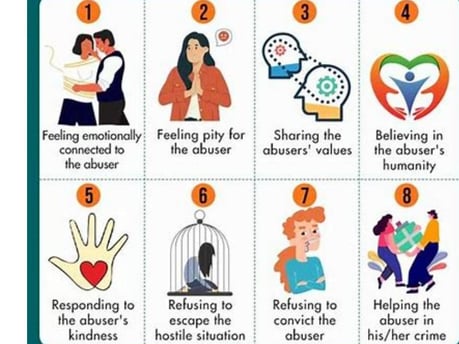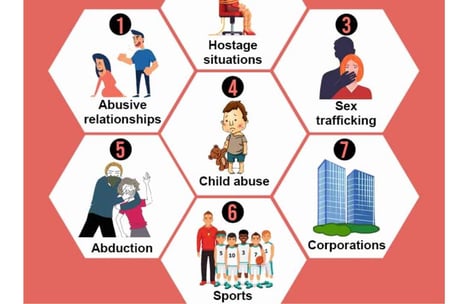
stockholm syndrome and Islamic Rules
GENERAL
Dr Hassan Al Warraqi
Stockholm syndrome Palestine and Islamic rules
It is a psychological phenomenon in which individuals develop a positive emotional attachment to their kidnappers or attackers.
The victim may hold positive feelings toward the offender, such as sympathy or love, despite the harm they have suffered
This syndrome is named after a bank robbery in Stockholm in which the four hostages developed a positive relationship with their captors.
They even defended them to the police after they were released.
While the term is often used in the context of hostage situations,
Stockholm syndrome can also occur in other abusive relationships, such as domestic violence and child abuse.
In these cases, the victim may believe that the abuser is their only source of support and protection,
and they may even develop feelings of love for them.
The exact causes of Stockholm syndrome are not completely understood
But it is believed to be a coping mechanism used by the victim to survive the trauma of their situation.
By identifying with the attacker, the victim may feel a sense of control and reduce their fear.
Here are some symptoms of Stockholm Syndrome:
Positive feelings toward the kidnapper: The victim may develop feelings of gratitude, sympathy, or even love toward his or her kidnapper.
Negative feelings toward authorities: The victim may abuse or dislike the police or other legal persons.
Identification with the kidnapper: The victim may adopt the kidnapper's beliefs and values.
Memory distortion: The victim may have difficulty remembering the details of their detention,
or they may remember them in a way that is more convenient for the kidnapper.
Stockholm syndrome is a complex and controversial phenomenon.
There is no one-size-fits-all explanation for why they occur, and it is not clear how common they are
One of the Israeli occupation prisoners held by the “Al-Qassam Brigades” wrote a farewell letter to the resistance members who accompanied her throughout the period of detention,
in which she expressed her thanks to them and praised their good treatment of her and her daughter.
The Al-Qassam Brigades published the letter of the captive Daniel and her daughter Emilia before her release in the exchange deal as part of the humanitarian truce.
The letter, which was handwritten in Hebrew and attached by the Al-Qassam Brigades with an Arabic translation, stated:
To the generals who have accompanied me in recent weeks,
it seems that we will part tomorrow, but I thank you from the bottom of my heart for the extraordinary humanity you have shown towards my daughter Emilia.
Prisoner Daniel added:
You were like parents, inviting her to your room at every opportunity she wanted.
She admits to feeling that you are all her friends and not just friends;
But good lovers.. Thank you, thank you, thank you for the many hours you were like a nanny
In her lelovershe also spoke about the patience of her captors and their provision of sweets, fruits, and other needs that were not available to her daughter,
and about her daughter’s mental health, saying:
Children do not like to be in captivity,
but thanks to you and to other good people we met along the way, my daughter considered herself a queen in Gaza. In general, she admits to feeling like a queen.
Danielle continued:
“I will be a prisoner of yours forever, because she will not leave here with psychological trauma,” stressing:
“We did not meet a person on our long journey from the police to the leaders who did not behave toward her with kindness, tenderness, and love.”
She said that she would remember the good behavior of the Al-Qassam members despite the difficult losses they suffered in the Gaza Strip.
At the end of her message, she also expressed her “wishes for health, wellness, and love for them, their children, and their families.”
Virtue is what the enemies testify to
Islamic rules in treating Stockholm syndrome
There are many verses about the captives, urging people to treat them kindly, be kind to them, and feed them
And they feed food out of love for Him to the needy, the orphan, and the captive man: 8
وَيُطْعِمُونَ الطَّعَامَ عَلَىٰ حُبِّهِ مِسْكِينًا وَيَتِيمًا وَأَسِيرًا الإنسان: 8
In the Sunnah, the Messenger of God, may God bless him and grant him peace, was
If he commands a commander over an army or a company,
he commands him in his privates to fear God and be good to those who are with him, and then says:
Fight in the name of God in the path of God. Fight those who disbelieve in God. Fight and do not go to extremes, do not betray, do not mutilate, and do not kill a newborn.
And what he did, may God’s prayers and peace be upon him, when he entered Mecca as a conqueror.
What do you think I will do to you?! They said: A generous brother and a generous nephew. He said: Go, you are free
His comprehensive advice was given to the Messenger of God,
may God bless him and grant him peace, and his general and comprehensive commandment for all goodness and goodness toward the prisoners: (Treat the prisoners well.)
All of these rules and many others are an improvement in treating them kindly, treating them kindly, feeding them, giving them alms, and even releasing them.
keywords
Stockholm syndrome, Palestine, Islamic rules for treating prisoners, treating them with kindness, being kind to them, and feeding them,It is a psychological phenomenon in which individuals develop a positive emotional attachment to their kidnappers or attackers.
Stockholm Syndrome, Islamic Law, the Palestinian Conflict, and Islam
This article provides a comprehensive and detailed examination of various sources exploring Stockholm Syndrome and its relationship with Islam from multiple perspectives.
It covers the syndrome’s definition, causes, and symptoms, the stance of Islamic law on it, and its relevance in contexts like the Palestinian conflict and the historical spread of Islam in Africa.
Additionally, one study analyzes the syndrome in the context of European societies and radical Islam.
Optimized for SEO, this content uses keywords such as "Stockholm Syndrome and Islam" and "Palestinian conflict and Islam" to enhance search engine visibility.
Main Sections
1. Definition, Causes, and Symptoms of Stockholm Syndrome
Definition: Stockholm Syndrome is a psychological condition where a victim develops sympathy or loyalty toward their captor or abuser, sometimes even defending them.
It’s described as "a state where the victim feels attachment or empathy toward the aggressor," reflecting a complex response to trauma.
Causes: Considered a survival mechanism in prolonged captivity or abuse, it arises from the victim’s helplessness and dependence on the captor.
"It occurs when the victim relies on the aggressor for survival," and "identifying with the captor may reduce fear and offer a sense of control."
Symptoms: Include positive feelings toward the captor (e.g., gratitude or affection), negative attitudes toward authorities, alignment with the captor’s beliefs, and memory distortion of the experience.
SEO Keywords: Stockholm Syndrome, causes of Stockholm Syndrome, symptoms of Stockholm Syndrome, psychological condition.
2. Islamic Law’s Stance on Stockholm Syndrome
Islamic Principles: Islam champions justice and equality, firmly rejecting oppression and coercion. "Islam prohibits compulsion and views forcing actions or feelings as a violation of human rights."
Absence of Terminology: While "Stockholm Syndrome" isn’t explicitly mentioned in the Quran or Sunnah, Islamic teachings emphasize human dignity, protection from exploitation, and resistance to aggression.
Islamic Guidance: Islam discourages attachment to aggressors, urging victims to seek liberation and justice. "Islam calls for dealing with enemies justly and encourages protection and support," recommending psychological and social aid for those affected.
SEO Keywords: Islamic law, Stockholm Syndrome and Islam, justice in Islam, human rights in Islam.
3. Stockholm Syndrome in the Context of the Palestinian Conflict
Israeli Captives: Sources suggest the syndrome may emerge among Israeli captives in Gaza due to total dependence on captors for basic needs, extended captivity, and potentially humane treatment.
A released captive’s letter thanking resistance members for treating her and her daughter "like parents" exemplifies this.
Islamic Values: The Palestinian resistance highlights its adherence to Islamic and humanitarian values in handling captives, possibly fostering gratitude in some cases.
Palestinian Captives: Conversely, the syndrome is unlikely among Palestinian prisoners due to oppressive conditions, torture, and dehumanization in Israeli jails, fueling hostility rather than empathy.
SEO Keywords: Stockholm Syndrome and Palestinian conflict, Gaza captives, Palestinian resistance, humane treatment.
4. Questioning Islam in Africa as a Form of Stockholm Syndrome
Critical Hypothesis: One source provocatively questions whether the spread of Islam in Africa reflects Stockholm Syndrome, tied to Arab colonization, land seizure, slavery, and mass violence.
Slave Trade: Estimates suggest 9 million Africans were enslaved via the Trans-Saharan trade, with brutal treatment including castration and genocide altering demographics. "Arabs resisted abolishing slavery even after global recognition of its harms."
Social Impact: It argues that embracing Islam might be a psychological response to oppression, though this view is controversial and lacks broad scholarly consensus.
SEO Keywords: Islam in Africa, Stockholm Syndrome and slavery, Arab colonization, African Islamic history.
5. Stockholm Syndrome, Radical Islam, and European Responses
Conflict Analysis: A study examines tensions between Muslim communities and European majorities, focusing on radical Islam as a key driver beyond racism or economic disparity.
Extremist Ideology: It reviews writings by figures like Sayyid Qutb, noting their influence in framing the West as a threat to be eradicated.
Statistics: Polls reveal significant percentages of European Muslims support Sharia, justify attacks, and view perpetrators as "martyrs."
Social Issues: Rising crime rates, "honor crimes," and forced marriages among Muslim youth, alongside foreign-funded extremist imams, are highlighted.
Multiculturalism’s Failure: The study critiques multicultural policies for bolstering radicalism, warning of "cultural pathologies" within Muslim communities rather than European racism as the primary integration barrier.
SEO Keywords: Stockholm Syndrome and radical Islam, Islam in Europe, multiculturalism, Sayyid Qutb.
Conclusions
The sources offer complex and varied insights into Stockholm Syndrome and its ties to Islam. While Islam upholds justice and compassion, rejecting coercion, the syndrome raises questions about victim responses in captivity or oppression.
In the Palestinian conflict, it may appear among Israeli captives due to humane treatment, but is improbable among Palestinians due to harsh conditions. The notion of Islam in Africa as a syndrome is contentious, while the European study warns of radical Islam’s cultural impact.
Understanding these issues demands a nuanced grasp of psychological, religious, historical, and social contexts.
SEO Keywords: Stockholm Syndrome and Islam, Islamic law, Palestinian conflict, Islam in Africa, radical Islam.
What Is Stockholm Syndrome?
This article delves deeply into Stockholm Syndrome, its relationship with Islamic law, historical contexts like Islam in Africa, and its relevance in conflicts such as the Palestinian-Israeli struggle.
Optimized for SEO, it incorporates keywords like "Stockholm Syndrome definition," "Islam and Stockholm Syndrome," and "Palestinian captives" to boost search engine rankings while providing a thorough analysis.
What Is Stockholm Syndrome?
Stockholm Syndrome is a complex psychological condition where victims develop positive feelings or empathy toward their captors or abusers.
This empathy can evolve into loyalty or even defending the aggressor.
Named after a 1973 bank robbery in Stockholm, Sweden, where hostages expressed affection for their captors post-release, it’s believed to be a survival mechanism.
In life-threatening situations, victims, feeling helpless and dependent on the captor for basic needs, adopt this response to cope with trauma.
SEO Keywords: Stockholm Syndrome definition, psychological condition, survival mechanism, Stockholm 1973.
How Is Stockholm Syndrome Viewed in Islam?
Islam fundamentally promotes justice and equality, rejecting all forms of oppression and exploitation.
From an Islamic perspective, Stockholm Syndrome may be seen as a result of psychological coercion and exploitation, which is condemned in Islamic teachings.
While the term itself isn’t mentioned in the Quran or Sunnah, Islamic principles prioritize human rights, encouraging compassionate treatment and urging victims to seek protection, justice, and psychological support to overcome such conditions.
SEO Keywords: Stockholm Syndrome in Islam, Islamic justice, human rights in Islam, psychological coercion.
Is the Practice of Islam in Some Regions a Form of Stockholm Syndrome?
Some argue that the spread of Islam in Africa—linked to Arab colonization, violence, and enslavement—might reflect a broader form of Stockholm Syndrome.
This claim suggests that adopting the colonizers’ religion and values could stem from historical oppression.
However, this is a complex historical issue, involving diverse cultural and religious interactions over centuries, and cannot be reduced solely to Stockholm Syndrome.
SEO Keywords: Islam in Africa, Stockholm Syndrome and colonization, Arab slavery, historical Islam spread.
What Considerations Arise Regarding Stockholm Syndrome in Captivity and Conflicts?
In prolonged captivity or conflicts, Stockholm Syndrome emerges as a controversial psychological phenomenon.
Factors like total dependence on captors, extended detention, and personal interactions can foster positive feelings.
Politically and media-wise, such sentiments among captives can shock their societies, undermine leadership trust, and challenge official narratives.
SEO Keywords: Stockholm Syndrome in captivity, conflict psychology, captive dependence, media impact.
How Does Islamic Law Address the Treatment of Captives?
Islamic teachings emphasize humane treatment of captives, with Quranic verses and Prophetic traditions advocating for feeding and caring for them.
The Prophet Muhammad (PBUH) exemplified mercy, even pardoning former enemies upon conquering Mecca.
The general Islamic guideline is to "treat captives kindly," fostering an environment that rejects harm or exploitation.
SEO Keywords: Islamic law captives, humane treatment in Islam, Quran and captives, Prophetic mercy.
Why Is Stockholm Syndrome Unlikely Among Palestinian Captives?
Unlike some cases, Stockholm Syndrome is improbable among Palestinian captives in Israeli prisons.
Psychological, cultural, and political factors—marked by persistent hostility and injustice—shape their experience.
Harsh detention conditions, physical and psychological torture, and deprivation of basic needs create an oppressive environment that fosters resentment rather than empathy.
SEO Keywords: Palestinian captives, Stockholm Syndrome unlikely, Israeli prisons, oppression impact.
How Do Some Thinkers View "Jihad and Migration" and Its Impact on Women in Islam?
Certain thinkers interpret "jihad and migration" as a dual dynamic of attack and retreat, applied to women, resulting in what they call an "Islamic Stockholm Syndrome."
They argue it enforces female submission, creating obedient families and a unified Muslim society.
Here, "jihad" is framed as a constant threat of violence, yielding psychological compliance.
This view is contentious and widely rejected by Muslims as a misrepresentation of jihad’s broader meanings.
SEO Keywords: Jihad and migration, Islamic Stockholm Syndrome, women in Islam, psychological submission.
What Concerns Surround Sharia Law Application in Europe and Its Impact on Western Freedoms?
Applying Sharia law in Europe raises concerns about its effects on Western freedoms—equality, free speech, and minority rights.
Critics argue that coexistence with secular laws could undermine liberal democracy, leading to parallel societies with divergent norms.
Some strict Sharia interpretations may clash with universal human rights, potentially fostering discrimination or violence against groups like women, LGBTQ+ individuals, and non-Muslims, as evidenced by certain incidents and religious leaders’ statements.
SEO Keywords: Sharia in Europe, Western freedoms, democracy concerns, human rights and Sharia.
FAQs on Stockholm Syndrome, Islamic Law, and Beyond
1. What Is Stockholm Syndrome, and Under What Conditions Might It Appear?
Stockholm Syndrome is a psychological state where victims show positive emotions—empathy, loyalty, or defense—toward their captors.
It typically arises in kidnapping, captivity, or ongoing abuse, where helplessness drives a survival-based bond with the aggressor.
SEO Keywords: Stockholm Syndrome conditions, victim empathy, captivity psychology.
2. How Does Islam View Coercion and Psychological Exploitation in Relation to Stockholm Syndrome?
Islam champions justice, rejecting coercion and exploitation.
Stockholm Syndrome, as a product of psychological manipulation, contradicts Islamic values.
Victims are encouraged to seek support to escape such states.
SEO Keywords: Islam and coercion, psychological exploitation, Islamic support.
3. Is There a Direct Reference to Stockholm Syndrome in Islamic Texts (Quran and Sunnah)?
No direct mention exists, but Islamic texts emphasize human rights, captive treatment, and anti-oppression principles, offering a framework to address similar phenomena.
SEO Keywords: Stockholm Syndrome in Quran, Islamic texts, anti-oppression.
4. How Did Islamic Law Guide Captive Treatment, and Could This Lead to Positive Feelings?
Islamic law mandates kindness to captives, with examples of non-Muslim captives in early Islam appreciating Muslim treatment.
Humane care might reduce hostility and spark attachment, especially over time.
SEO Keywords: Islamic captive treatment, humane care, captive feelings.
5. How Might "Jihad and Migration" Relate to an "Islamic Stockholm Syndrome"?
Some frame "jihad and migration" as enforcing submission, particularly among women, creating a so-called "Islamic Stockholm Syndrome."
This controversial view oversimplifies jihad’s broader context.
SEO Keywords: Jihad and Stockholm Syndrome, women submission, Islamic ideology.
6. How Are European Muslim Attitudes Like Sharia Support Interpreted in Terms of Stockholm Syndrome or Radicalization?
Support for Sharia or lack of loyalty among some European Muslims is linked to cultural pathologies or radical polarization, not strictly Stockholm Syndrome, reflecting ideological and social dynamics.
SEO Keywords: Sharia support Europe, Muslim radicalization, cultural pathology.
7. How Do Islamic and Western Laws Compare in Addressing Criminal Responsibility in Mental Health Cases?
Both recognize intent (mens rea); Islam categorizes insanity (absolute, intermittent, partial) to assess responsibility, akin to Western exemptions, though diagnostic and procedural details differ.
SEO Keywords: Islamic law insanity, Western law mental health, criminal responsibility.
8. How Might Prolonged Conflicts Like the Palestinian-Israeli Struggle Influence Stockholm Syndrome-Like Phenomena?
Extended conflicts can foster complex psychological bonds.
Humane treatment might spark empathy, while oppressive conditions, as with Palestinian captives, reinforce hostility.
SEO Keywords: Palestinian-Israeli conflict, Stockholm Syndrome conflict, captive psychology.
Conclusion
This SEO-optimized exploration of Stockholm Syndrome bridges psychological insights with Islamic law, historical contexts, and modern conflicts, offering a nuanced understanding of its manifestations and implications.
SEO Keywords: Stockholm Syndrome overview, Islam and psychology, Palestinian conflict analysis.













